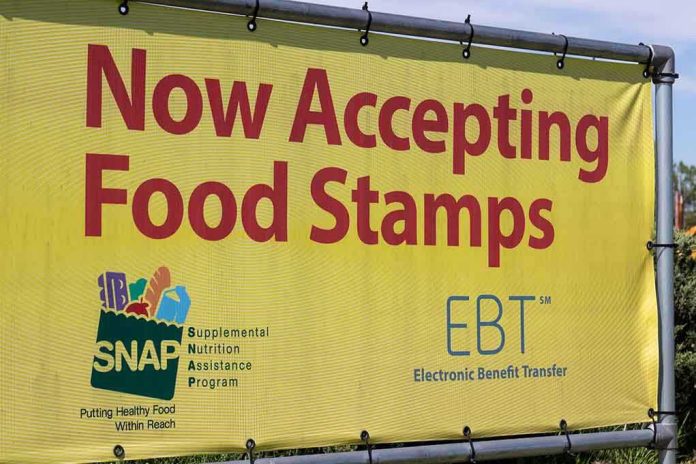
What if government programs paid benefits to thousands who had already died—and no one noticed for years?
Story Snapshot
- Secretary Brooke Rollins exposes systemic SNAP fraud, citing 186,000 deceased individuals still receiving benefits
- States’ data reveal deep flaws in monitoring, accountability, and oversight of SNAP rolls
- Federal officials call for sweeping reforms, but political gridlock and shutdown delays action
- Fraud undermines public trust, wastes taxpayer money, and threatens help for truly needy Americans
SNAP’s Disturbing Data: Deaths on the Docket
Secretary Brooke Rollins, citing state-supplied data, revealed that approximately 186,000 deceased Americans remain listed as active recipients of benefits under the Supplemental Nutrition Assistance Program (SNAP). While Americans tune out government shutdown drama, these numbers quietly underline a stunning administrative failure. SNAP, designed to help the nation’s poorest, now finds itself at the center of a public reckoning. The revelation isn’t just about dollars—it’s about the moral and managerial backbone of American welfare.
Rollins’ comments underscore a critical point: every erroneous payment represents not just wasted taxpayer money, but a direct diversion of resources from families truly in need. The magnitude of the error—a population equivalent to a midsize U.S. city—turns a bureaucratic oversight into a matter of national concern. Americans who believe government programs are closely monitored may find themselves questioning the competence of federal and state agencies responsible for SNAP oversight.
Enough is enough.
SNAP fraud is out of control and hardworking Americans are footing the bill.
In the states that shared their data, there were well over half a million cases of fraud — and that’s just the tip of the iceberg. Why are other states suing us for asking for the… pic.twitter.com/rS8NKcw9ia
— Secretary Brooke Rollins (@SecRollins) November 13, 2025
The Mechanics of SNAP Fraud: How It Happens
SNAP fraud manifests in multiple forms, but the persistence of deceased recipients on official rolls exposes fundamental process failures. State welfare departments are tasked with updating records and cross-checking databases, yet the continued inclusion of dead beneficiaries suggests irregular or outdated data practices. Technology exists to flag deaths, but bureaucratic inertia, fragmented record-keeping, and inconsistent data-sharing between agencies create loopholes that fraudsters—and unwitting officials—exploit.
States submit periodic updates to federal authorities, but the lag between a recipient’s death and official removal from benefit rolls can stretch from months to years. In some cases, relatives or third parties continue redeeming benefits, undetected. The process is further complicated by privacy laws and outdated software. Secretary Rollins’ public alarm is not just a call for reform but an indictment of systemic complacency.
Political Stalemate and Reform: Who Bears Responsibility?
Calls for reform have grown louder in the wake of Rollins’ disclosure, but the ongoing government shutdown and entrenched partisanship stall any substantive action. Congressional hearings rehash familiar talking points, focusing on fraud as both a budgetary and moral failing. Yet, concrete proposals—such as enhanced data integration, mandatory periodic audits, and increased penalties—struggle to gain traction. The political gridlock leaves SNAP administrators in limbo and taxpayers footing the bill for inaction.
Common sense dictates that any system hemorrhaging funds to the deceased needs urgent repair. Conservative commentators argue that such failures prove the necessity of smaller government, tighter eligibility checks, and personal responsibility. Opponents warn against using fraud as an excuse to cut benefits for those in genuine need. Both sides agree, however, that the current situation is indefensible and undermines confidence in public assistance programs.
Public Trust and the Path Forward
SNAP fraud, especially on the scale revealed by Secretary Rollins, shakes the foundation of public trust in government stewardship. Americans want assurance that their tax dollars are used wisely and reach those truly in need. Transparency, accountability, and swift reform are essential to restore faith in SNAP and similar programs. The challenge lies not just in fixing broken processes but in rebuilding public confidence—one accurate payment at a time.
The open question remains: will the bureaucracy respond with urgency, or will the scandal fade into the background, overshadowed by the next news cycle? For now, the dead still draw benefits. The living wait for solutions.
Sources:
USDA head says ‘everyone’ on SNAP will now have to reapply




